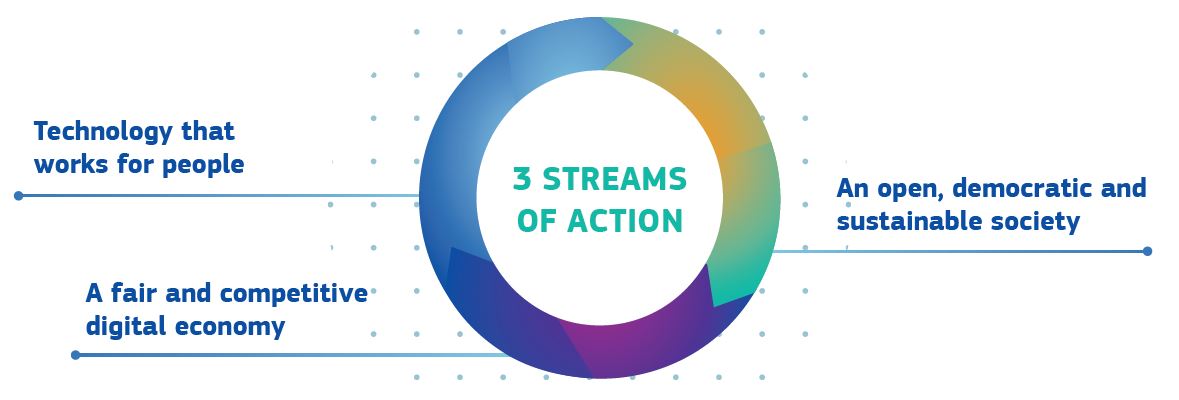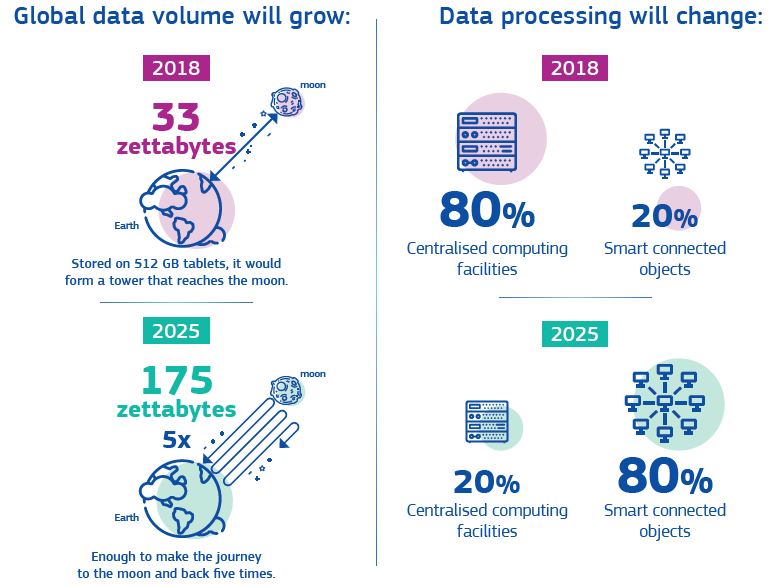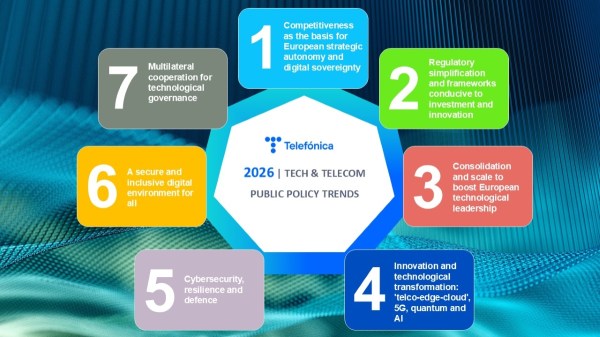 Enrique Medina
Enrique Medina
The global health emergency caused by Covid19 has revealed the importance of technology and communications networks as a fundamental asset for the economy and the well-being of people. As an example, thanks to the efforts made by European operators up to the moment, citizens, businesses and public administrations have been able to stay connected and active, despite the distance imposed by quarantine and social isolation. If technology and communications networks are playing a leading role during the period of confinement, they will be even more relevant to overcome the next challenge we will face: the post-virus recovery.
The European Digital Strategy: An opportunity to boost Europe’s global leadership
Shortly before the global spread of Covid19, European Commission President Ursula von der Leyen presented the European Digital Strategy to shape the region’s digital future. This European approach to the digital transformation means empowering and including all citizens, strengthening the potential of companies and addressing global challenges with core European values. The aim is to maximise the benefits of digitisation to become a globally competitive, sustainable and inclusive digital economy and society. This European Digital Strategy shares Telefónica’s vision, expressed in the Digital Manifesto, to achieve a human-centric and value-based transition to digital society.
However, the current global crisis has put the economy of European countries to sleep. As a result, the pace of the European Digital Strategy seems to have slowed down momentarily in favour of solutions that boost the real economy in the short term, ensure the well-being of Europeans and return the EU to “strong, sustainable and inclusive growth“, according to Charles Michael, President of the European Council following the agreement of the Eurogroup to support Europe’s economies.
Sooner or later, confinement will come to an end, the economy will revive, and the European Digital Strategy will be developed more vehemently and necessarily than ever before. This project will be fundamental for Europe to find a new socio-economic balance that will help to completely overcome the coronavirus crisis.

Technology that works for people
The European Strategy believes there is a need to promote a human-centric approach to digital technologies, built around trust, privacy, personal data protection and democratic integrity. Everyone should be able to acquire the skills needed to participate actively in the digital economy, irrespective of age, gender or professional background.
A fair and competitive economy
The Commission also stands out the importance of ensuring a level playing field for big and small businesses, stating that some platforms have acquired significant scale, which effectively allows them to act as private gatekeepers to markets, customers and information.
Europe needs to support its industries to embrace digital solutions to boost productivity and remain competitive reducing over-reliance on digital solutions created elsewhere. The Commission assumes that competition rules should be adapted and there will be a review of the market definition notice to take account of new digital business models. This is also something Telefonica stated in its Digital Manifesto.
An open, democratic and sustainable society
The sale of illicit, dangerous or counterfeit goods, and dissemination of illegal content must be tackled as effectively online as it is offline. Trust in the online world means helping consumers take greater control and responsibility for their own data and identity. For this, the rules applicable to digital services across the EU should be strengthened and modernised, clarifying the roles and responsibilities of online platforms.
The EU needs technology that improves the planet and our quality of life – fighting climate change, better healthcare systems, less traffic congestion, cleaner energy, more sustainable food production, a biodiverse and greener environment, safer communities, and increased societal inclusion.
The Commission closes with a reference to the international dimension looking for a Global Digital Cooperation Strategy that will put forward a European approach to the digital transformation vested in European values projecting them onto the international stage and engaging its partners.
European Data Strategy
Telefonica’ vision is that Data has become a key factor of production, and the value it creates must be shared back with the entire society participating in providing this data. According to Thierry Breton, Internal Market Commissioner: “My objective is to make Europe a global data hub for data, both personal and industrial, benefiting all European economic players –SMEs, start-ups, large groups –and, of course, all European citizens”. Expecting a further and more detailed development of the proposal, overall, Telefónica supports this ambitious approach of the strategy and welcomes the creation of European Data spaces and European Cloud as well as the legislative framework to boost trust and innovation in Artificial Intelligence while respecting Europe’s fundamental rights and ethics.
To paraphrase Ursula von der Leyen: “We want the digital transformation to power our economy and we want to find European solutions in the digital age”. This is a strategy to change how we produce and how we consume. A strategy for growth. The European Digital Strategy is a response to all these challenges, and we believe that Telefonica has a main role to play in this process and so, we look forward to accompanying the Commission in the fulfilment of expectations for the development of our societies.

These aspirations are unattainable without a complete digital transformation of society. Therefore, Telefonica shares the Commission’s perspective for digital transformation empowering and including every citizen, strengthening the position of the European companies and meeting global challenges with European core values. The digital transition should work for all, putting people first and opening new opportunities for business. We all must assume our task in maximizing the opportunities of the digitalisation for our societies and economies, whilst facing some significant challenges. And this also requires a flexible policy framework and appropriate regulatory conditions to promote investment and the adoption of digital technologies.
As Europe advances in its digital aspirations, we are facing an unknown global emergency that will undoubtedly have a strong impact on the European economy and society in the coming years. However, the European Union’s new Digital Strategy is a very valuable instrument for facing new scenarios and overcoming difficulties.





